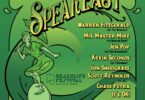“We’ve got a lot to do tonight,” Will Shortz said as he strolled onto the stage of UCLA’s Royce Hall Wednesday night. He spoke with an unassuming presence he would maintain throughout the evening, as if it didn’t make much difference whether there were hundreds of people in the audience (which there were) or a dozen.
Shortz is the crossword editor at The New York Times, the puzzle master on NPR’s “Weekend Edition Sunday,” the director/founder of the American Crossword Puzzle Tournament and the founder of the World Puzzle Championship.
.jpg)
It was strangely inspiring to see a man so passionate talking puzzles. He’s the brilliant guy who found a way to make his living doing what he’s loved most since childhood. It’s the nerdy American dream.
And Shortz could be labeled a nerd if he didn’t wear his smarts with such charm and confidence. When asked, during the Q&A what the difference was between crossword people and Sudoku people, Shortz grinned and replied, “Well with Sudoku, you don’t have to know anything.”
Later, a floor-hogging woman tried to challenge his comment that he quit law school because it was “too boring.” When the woman said that in practice, law could be very creative, Shortz mused, “I don’t know if you want to get too creative with the law.”
Shortz took a few minutes to talk about his work at The Times. He spends much of his time reviewing submitted crosswords for publication. He’s looking for a good theme, fun vocabulary and a lack of cliché words. Crossword has its own set of clichés: usually short vowel-heavy words. When he decides to accept a puzzle for publication, he decides which day of the week the puzzle is (Monday is a beginner puzzle and each day gets more challenging from there) and changes roughly half the puzzle clues to match the day’s appropriate level of difficulty.
Unless you’re the master himself, puzzle construction doesn’t pay the bills: even the New York Times only pays $135 per daily crossword, a rate Shortz has petitioned to have increased.
Shortz was most concerned with the second part of the night: he had talked about word games, now it was time for the audience to play. I’m told the format of the live puzzles is much like that of his NPR show. He explains a game (example: “I’m going to name a word, then you omit one letter and add ‘ma’ in its place to create a new word”), calls out the puzzle, and the audience yells the answer.
The puzzles were humbling for my mom and I, as there were some serious puzzlers in the audience. When Shortz called out a puzzle, a dozen people in the audience would be yelling the answer while my mind was still on the “now let me see here…” phase. Part of the brilliance of these puzzlers, I quickly realized, was that they had omitted the “let me see” phase altogether.
The evening ended with Patrick Creadon, the director of the hit crossword documentary, “Wordplay” (second only to “An Inconvenient Truth” for highest-grossing documentary of 2006). Creadon told a story about inviting Bill Clinton and Bob Dole to talk about the famous 1996 election day crossword that featured the clue, “Lead story in tomorrow’s newspaper” in which the answer worked for both “CLINTON ELECTED” and “BOB DOLE ELECTED”. Dole initially turned Creadon down until Clinton called Dole and convinced him to be in the documentary.
The anecdote was another of the night’s reminders that, for some, these word games are to be taken very seriously.







